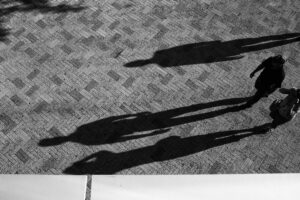Father Chet, July 1983
As we seek wholeness, we are to continually consider the repression of our shadow. How we may turn primitive, undeveloped, qualities to good use in service to God, neighbor, and self.
This is not easy work. But God gives us sufficient psychic energy to handle a particular part of our shadow which is ready for harvesting while others stay hidden.
We have choice to not do the work. But if we make that choice, if we repress and deny that part of the conscious, the shadow becomes negative and evil.
Causes of Repression
Repression of this “ripe” shadow may be due to simply ignorance. We may not be aware of the existence of the shadow or how to recognize its appearance.

Repression may also be due to an unwillingness to change our accustomed ways of living. Criticism—even if well-meaning—by parents, teachers and peers can contribute to repression of the shadow.
We may have a deep fear of the unknown consequences that could result from using the energies of the shadow.
Malice may motivate us. Or an unwillingness to sacrifice our freedom and independence for the sake of the higher will of God.
Finally, repression may be a result of some severe trauma which has created a memory so painful that our consciousness cannot assimilate it.
Most of the time our motives regarding assimilation of the shadow are a mixture of good and not-so-good reasons.
Why Work to Overcome
All of us – individuals, groups, institutions, and nations – have a responsibility to discover and develop our unconscious shadow in order to attain the wholeness to which we are called.
Wholeness entails a balance in the polarity of opposites. The most basic of the polarities we face during our earthly life is a balanced tension between our consciousness and the unconscious shadow.
We must try to discover that part of our shadow God wills to become conscious. When we do, then we should consciously strive to use the newly discovered energies in good, creative, and productive ways. This task is called “the redemption of the shadow.”
The Redemption of the Shadow
Redeeming the shadow is our most important task in life.
We may think of the repressed portion of our psyche as being in captivity and awaiting release from its imprisonment.
Our ability to love will never reach its full potential otherwise.
The human race, too, has an unredeemed, repressed shadow that can be put to good use for the welfare of society.
Each of us has a moral responsibility not only to save our own repressed shadow from neglect and a lack of creativity, but also to help other individuals, groups, and institutions redirect the energies of their shadows.
Kingdom of God
We can think of the wholeness of the Kingdom of God for which we pray in the Lord’s Prayer as consisting of the task of the redemption of the shadow.
Success, happiness, fulfillment, satisfaction, creativity, productivity, worthwhileness, and wholeness, all depend upon the degree to which we succeed in uncovering our shadow and put its energies to work for the welfare of all, thus making God’s Kingdom a closer reality.
If we are doing all we can in this area of our lives, much good will come from it.
Steps to Take
The redemption of the shadow involves several steps:
- Consciously recognizing and acknowledging the contents of the repressed shadow.
- Discovering the right and best way to develop, educate, and use the energy of the shadow so that it will accomplish the greatest possible good for the most people.
- Knowing a proper goal and destiny for each aspect of the shadow as it comes to the surface of consciousness. To establish this will require the fullest possible use of human and divine wisdom. It may take trial and error to find the best way (consider the help of a spiritual companion). For instance, how does one channel an eruptive anger?
- Sacrificing and struggling to accomplish the actualization of this potential for good. (This requires a strong ego, a well-developed mind, a disciplined will, a loving heart. It will involve all of our conscious faculties. It will also involve the maximum development of the four psychological functions of sensation, intuition, thinking and feeling. Thus a working knowledge of one’s personal temperament will greatly aid in actualizing this potential for good.)
Ongoing Repression
And what will happen if we fail to carry out these steps? Harmful results will occur if we as individuals, or institutions, or nations fail to discover, educate, and put to good use our individual, institutional, or national shadows.
The shadow becomes a grace and an immense force for good when properly used; but the same shadow becomes a demon and a terribly destructive force when we fail to put it to good use.

Carl Jung put it this way: “When we leave things to the unconscious shadow, they get done but they are done against us instead of for us.”
We must rule the shadow; otherwise it will rule us. For example, the psychic behind anger and violence is actually the same energy that can be used in loving service of others. Unless it is put to good use in helping others, it will sooner or later express itself in hatred and destruction.
As for our collective shadow, in some cases the results can be so terrible that they defy human imagination.
We have a devastating example of this in the projections of shadow material by rulers in Germany onto Jewish and other marginalized people and political enemies. The result was the subsequent holocaust, concentration camps, and the extermination of millions of innocent people.
This dynamic continues right up to the present in countries and societies all over the world.
Editor’s Note: This is the second of four installments of Fathers Chet’s writings on wholeness and the shadow. The first was published in April and subsequent reflections will continue in August and October.
